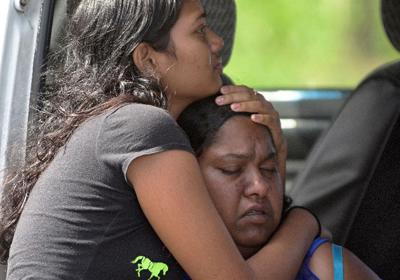Last week, two young men lost their lives violently. One was a 17-year-old footballer in Maloney who was shot outside his home on Saturday night. He fought for his life for several days before passing away on Thursday afternoon at the Eric Williams Medical Sciences Complex. The other young man, known to law enforcement, was shot and killed during an alleged attempted carjacking at Long Circular Mall in St James. This incident was witnessed by security guards around lunchtime on Wednesday when he reportedly attempted to rob a woman of her Nissan Tiida.
During the funerals, gunshots, and public panic, what stood out the most was not the violence itself—Trinidad and Tobago has sadly grown numb to that—but the stark contrast in how we respond to tragedy, the stories we choose to tell, and the roles our leaders continue to play rather than embody.
Let’s start with the 17-year-old, Zwade Alleyne. Shot in front of his home in Maloney, he spent his final days surrounded by loved ones, teachers, and peers—people who remembered not just his talents on the football field but also the way he made them feel, seen, inspired and hopeful. There were no campaign speeches at his vigil, no performative mourning—just quiet grief, shared memories, and deep loss. His life had meaning, and those who knew him didn’t need to convince the rest of us; his impact spoke louder than any press release.
Yet, the Ministry of Education couldn’t resist jumping the gun—literally. Hours before his actual death, they issued a public condolence message. “Alleyne was still holding on,” his uncle had to clarify. Imagine that the very institution responsible for shaping young minds couldn’t verify if one of their own was still alive. In their haste to show compassion, they displayed carelessness—optics over accuracy.
Now, let’s pivot to the second young man. He, too, was gunned down. Unlike Alleyne, he was known to law enforcement and was recently bailed out. During the attempted carjacking at Long Circular Mall, security guards witnessed him assaulting a woman in his attempt to rob her of her car. He died on the spot. His family has every right to grieve, but grief does not exempt us from the truth. Choices have consequences, and mourning does not erase history; it should prompt a sense of responsibility.
Instead, we watched another round of reputation resuscitation. “He was a good boy,” they said. “Deep down.” Maybe, but deep down isn’t where most of us live. We exist in the reality of his choices and those choices brought harm to others, to himself and to his family.
It’s a now-familiar ritual: T-shirts with angel wings, Instagram reels featuring slow-motion edits set to trap music, and Facebook posts proclaiming, “Only God can judge.” Nonetheless, here’s the reality—Trinidad and Tobago isn’t Heaven and we’re not God. We’re a society desperate for honesty, yet we’re only receiving noise and can’t confront the truth.
If you’re keeping track, that’s one gifted young footballer dead from a stray bullet and another young man killed—a carjacking gone wrong—both deaths occurring in a country growing numb to violence.
To remind us that danger doesn’t keep a schedule, the attempted hijacking happened in broad daylight, during lunchtime, in a mall parking lot. Criminals no longer lurk in the shadows; they walk freely in plain sight, guns in hand, confident no one will stop them.
What does that say about deterrence? About visibility? About the power of the State? The only thing hiding these days is leadership.
This brings us to the performative actions taking place in government. When former president Anthony Carmona said, in what has become a favoured quote, “The powers you think I have, I don’t,” we took it as a clever remark. Now it feels like a mantra. Leaders appear before cameras to declare intentions, boast about ribbon-cutting ceremonies, and outline plans, as if governing is just a never-ending campaign. They seem to be speaking at us, not leading with us.
Policy feels more like public relations. Urgent national issues—from crime to unemployment to misinformation—are met with talking points, not action. It’s as if the government is still campaigning, still relying on public amnesia, and still hoping we’ll be mesmerised by the spectacle. However, the stage lights are dimming, and the audience is restless.
Speaking of amnesia, it’s worth mentioning the week’s oddest twist: the public’s sudden belief that former president George Maxwell Richards had died—again. For the record, he passed away in 2018. Yet, timelines were flooded with “RIP” posts and heartfelt messages. The same phones we use to share entertaining clips and filter selfies were too busy for a quick Google search.
This isn’t just misinformation; it’s wilful laziness. When even our Education Ministry joins the error parade, it’s clear that we are not lacking access but rather accountability.
So here we are. Two lives lost. One mourned with dignity. One defended with delusion and still, our leaders posture while institutions flounder.
It’s time to stop performing grief, governance and knowledge. Trinidad and Tobago is too wounded for theatrics. We need truth, accountability and, most of all, action.
—Scarlet Benois-Selman is an educator, author and advocate for equity.



